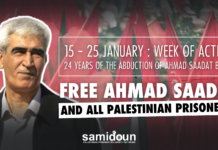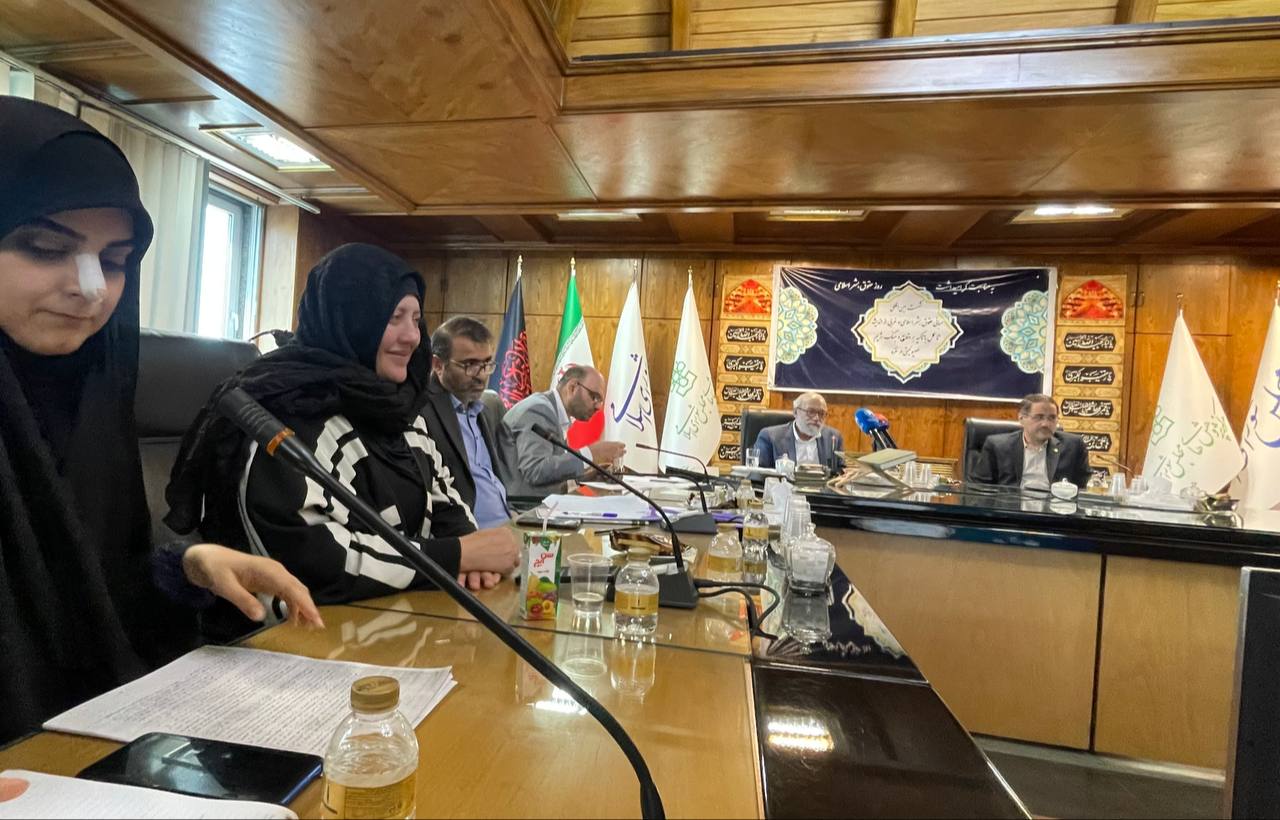
On 4 August 2024, Samidoun international coordinator Charlotte Kates was one of several international figures honoured with the 8th annual Islamic Human Rights and Human Dignity Award in Tehran, Iran.
During this year’s awards process, 42 human rights figures from 17 countries were nominated to the Islamic Human Rights and Human Dignity Award Committee, of which 6 people were selected as winners and three people given special honours on the occasion of the ceremony.
The awards were officially presented during an official ceremony in Tehran, Iran, in the presence of the head of the Iranian judiciary, representatives of non-governmental organizations, Kazem Gharibabadi, Secretary-General of the High Council for Human Rights of the Islamic Republic of Iran, and ambassadors of multiple countries based in Tehran.
8th Islamic Human Rights Prize celebrates defenders of ‘Oppressed Palestinians’
Press TV’s @gisoumisha Ahmadi reports from Tehran pic.twitter.com/tnRYcbWeVj
— Press TV 🔻 (@PressTV) August 5, 2024
The recipients of the 8th annual Islamic Human Rights Award were as follows:
The three special honourees: the martyr Ismail Haniyeh, the chair of the Political Bureau of the Hamas movement; the martyr Hossein Amir Abdollahian, the 13th Iranian Foreign Minister, and his family; and the Major General of the Islamic Revolutionary Guard Corps Mohammed Reza Zahedi, and his family;
and the six awardees: Ziyad Nakhaleh, the General Secretary of the Palestinian Islamic Jihad Movement; Siraj al-Haq, the former chair of the Jamaat-e-Islami Pakistan (JIP); Jaime Ermida, Permanent Representative of Nicaragua to the United Nations; Charlotte Kates, international coordinator of Samidoun Palestinian Prisoner Solidarity Network; Gilles Devers, French lawyer and human rights advocate; and Asadollah Asadi, the freed former Iranian diplomat.
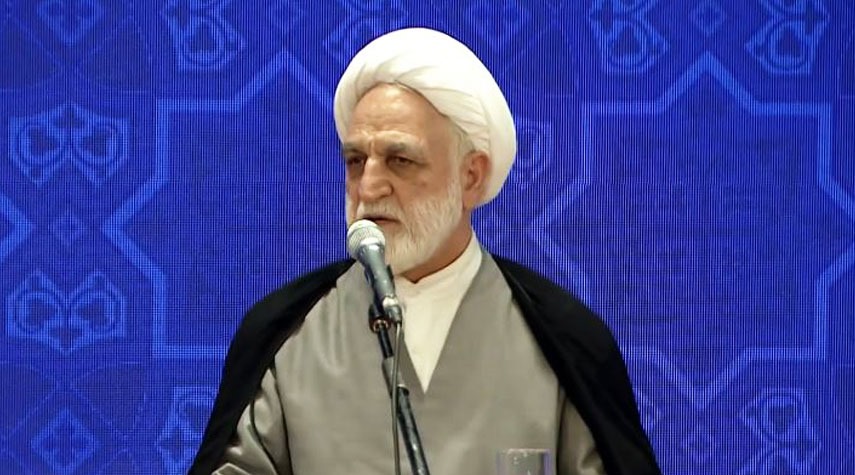
“Many people in the world in different countries, even in countries that support the crimes of the Zionist regime, including the criminal United States, have realized the actions of the fake regime, but that is not enough and the defenders of Islamic human rights must take greater steps to expose the crimes of the Zionist regime,” said the head of the Iranian judiciary, Hojjatoleslam Gholamhossein Mohseni Ejei, at a ceremony marking the Islamic Human Rights and Human Dignity Day.
In turn, the Secretary of the Human Rights Committee and vice-president of the Judiciary for International Affairs of the Islamic Republic of Iran, Kazem Gharibabadi, considered that the commemoration of the Islamic Human Rights and Human Dignity Day this year is “a complete reflection of the oppression that the Palestinian people are subjected to.”
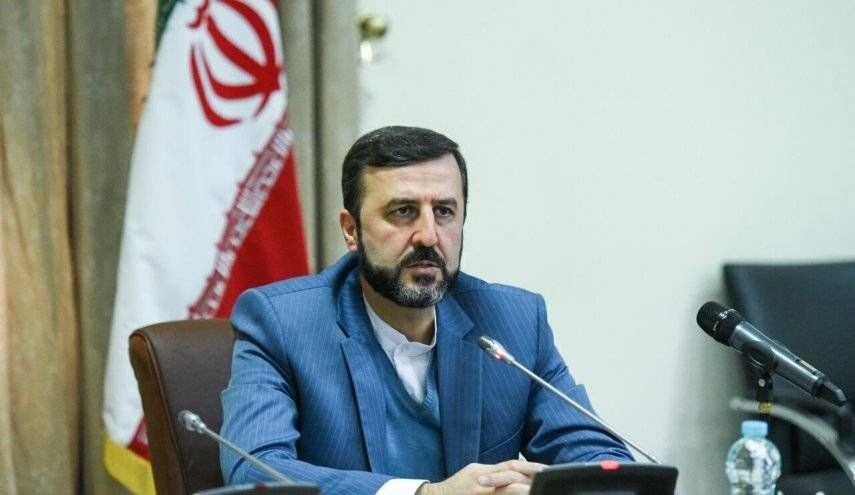
He added, “The spread of Islamophobia…incitement to hatred, and governments’ support for these measures under the pretext of freedom of expression is a dangerous phenomenon. Its spread and expansion increases hatred and violence against Muslims and is a threat to peace, security, and peaceful coexistence, and a threat to friendly relations between nations and followers of heavenly religions.”
Kates thanked the Human Rights Committee for the honor and award, emphasizing the role of the Islamic Republic in opposing American, Western and Zionist policies, and the support provided by the Iranian people to the resistance in Palestine, Lebanon and the region. In a video message played at the event, Kates noted that she and Samidoun are part of a global movement for justice in Palestine that has grown and blossomed as people everywhere fill the streets of cities and capitals for Palestine, demand to boycott the genocidal Zionist regime, take direct actions to shut down arms companies, and fill the lawns and halls of universities, and that this global grassroots movement firmly believes that the unified resistance forces of the region will take all measures necessary to hold the aggressors accountable for their assassination of Ismail Haniyeh, their violation of the sovereignty of Iran, and the past 76 years of genocide against the Palestinian people.
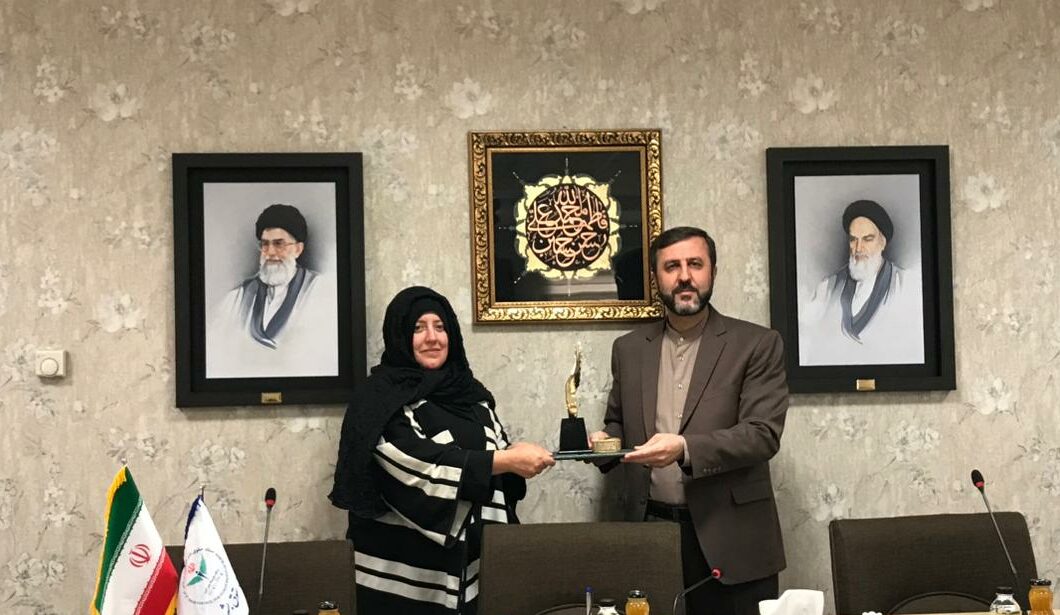
She dedicated the award to the Palestinian prisoners’ movement in Zionist jails, noting:
This award is truly for the martyrs and the prisoners of Palestine; to Walid Daqqah, the Palestinian freedom fighter, writer and revolutionary, imprisoned from 1986 until his martyrdom this year inside the occupation prisons, whose body remains imprisoned by the occupation. To Sheikh Khader Adnan, who won his freedom from the occupation prisons through hunger strikes on four occasions, who dedicated himself to supporting his fellow strugglers in the prisoners movement, who was martyred in May 2023 on his final hunger strike demanding freedom. For the prisoners of the high sentences, those the Zionist regime refuses to release, the leaders, the resistance strugglers who continue to fight for the liberation of Palestine every day behind bars.
For Abdullah Barghouthi, serving the longest prison sentence in history for his role in leading the Palestinian armed resistance. For Ahmad Sa’adat, imprisoned first by the Palestinian Authority under US and British guard, and then by the Zionist occupation regime. For Marwan Barghouthi and Abbas al-Sayyed and Ibrahim Hamed. For the imprisoned students, for Layan Kayed and Shahd Asafra and Hadeel Shatara, imprisoned in the Zionist jails for their commitment to liberation in their studies and in their society. For every one of the over 10,000 Palestinians held in the occupation prisons and the thousands more detained in their military torture camps like the infamous Sde Teiman. This is not an honour for myself, but for all of the Palestinian prisoners and the entire Palestinian people struggling for liberation and return.
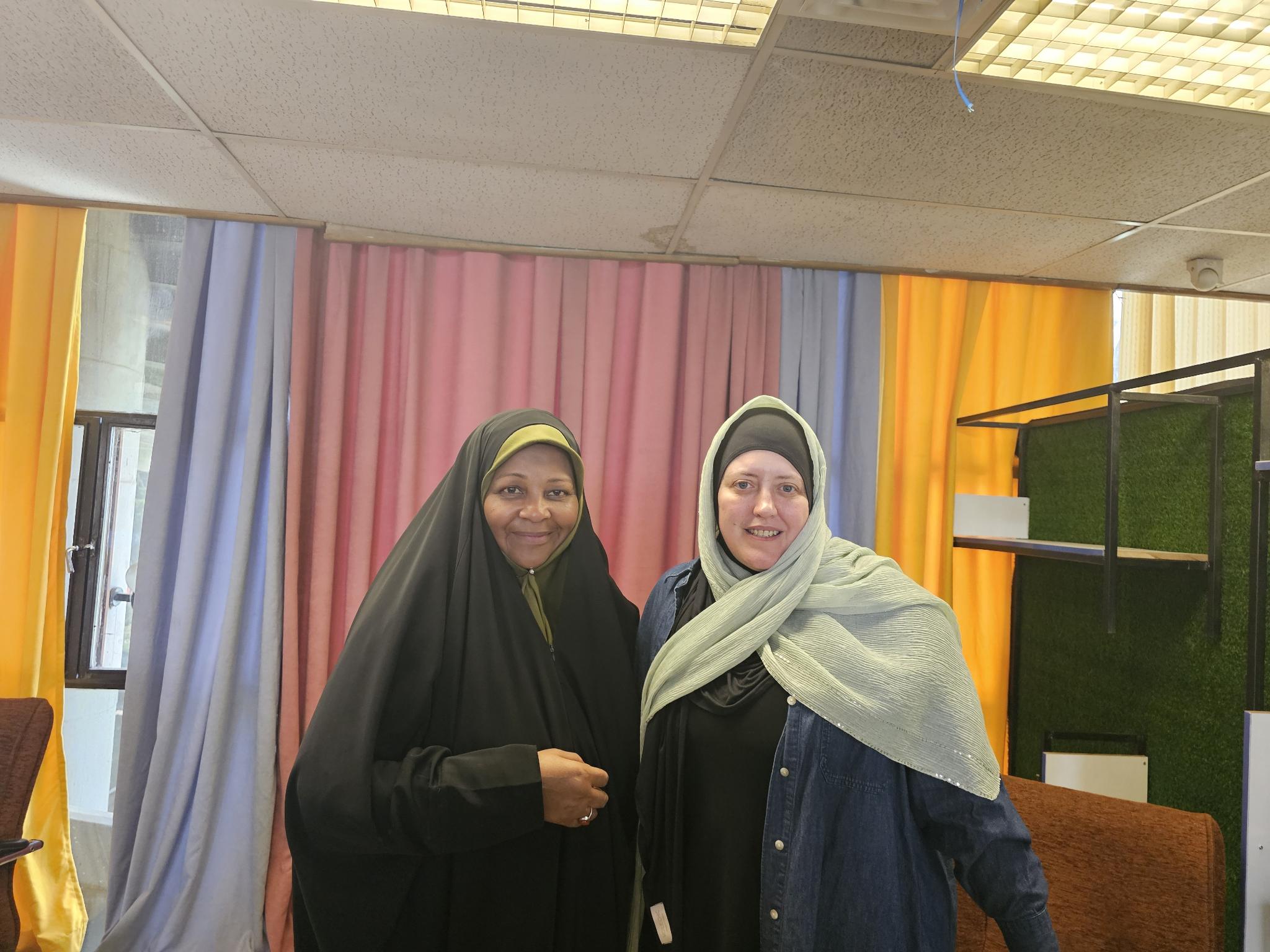
During her visit to Tehran, organized by the Institute for the Protection of Women’s Rights, a non-governmental organization, Kates engaged in a wide range of media interviews with Iranian television programs and other media, including Al-Ofogh, Press TV, Mizan, Mehr News, Safir TV, IRNA, ISNA and a number of other outlets, including a special interview with Marzieh Hashemi of Press TV.
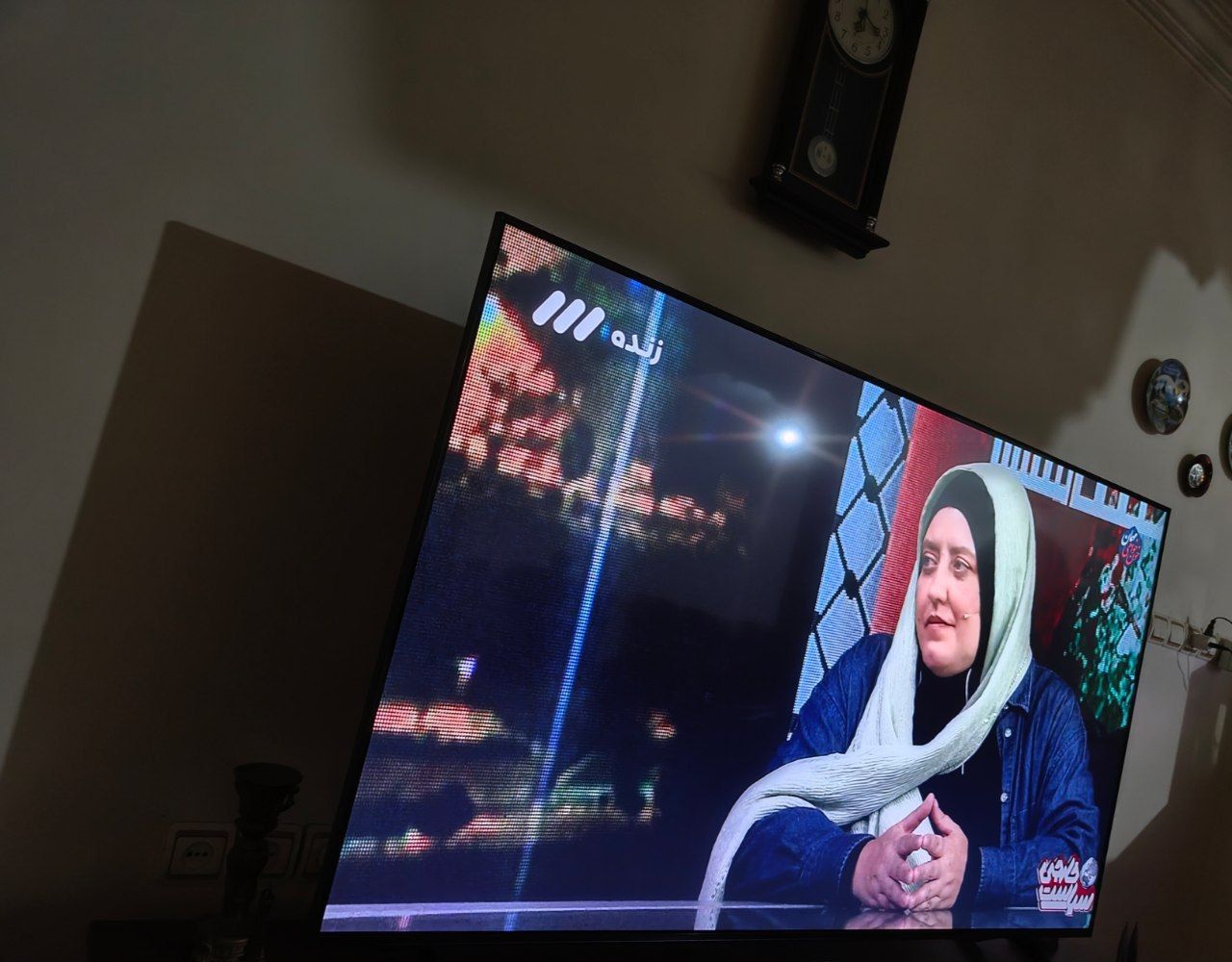
She also participated in a joint live interview with Gharibabadi on the evening of 4 August, in which she discussed both the condition of Palestinian prisoners as well as the repression targeting organizers for Palestinian liberation in a number of Western imperialist countries, including Germany, the United States, France and Canada, and in a special interview with “Foreign Affairs” on Safir TV, co-hosted by Elham Abedini.
View this post on Instagram
She also gave presentations at several meetings and forums while present in Tehran, including a meeting at the Iranian Parliament Research Centre on Islamic and Western principles of human rights, chaired by Elham Abedini of Samidoun Iran, and spoke at a meeting with women social activists on Palestinian women under attack in Gaza, where she spoke about the situation of Palestinian women detainees, the Dismantle Damon campaign, and the martyrdom of Wafa Jarrar, announced just that morning.
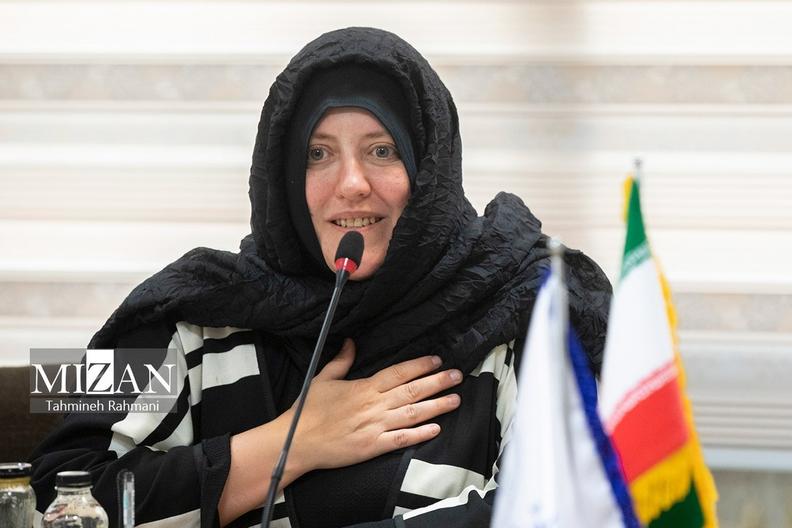
Her presentation at the forum is republished below:
It is a great honour to be here with you today in the Islamic Republic of Iran, and specifically today and at this moment, amid the ongoing Zionist genocide in Gaza against the Palestinian people, and amid the heroic role of the Resistance in Palestine and throughout the region, standing on the front lines not only in defense of Palestinian lives but in defense of humanity itself, and specifically at this time only days after the criminal assassination of the great martyred leader, Ismail Haniyeh, and the attack on the sovereignty of Iran. It is more important than ever to be here at this time and to express the conviction and faith of the people’s movements of the world in the unified resistance forces of the region to hold accountable those responsible for these horrific crimes and for 76 years of genocide in occupied Palestine.
I speak today as the international coordinator of Samidoun Palestinian Prisoner Solidarity Network, an international network of organizers, committees and activists organizing for the liberation of Palestinian political prisoners as part and parcel of the liberation of Palestine from the river to the sea. From the inception of the Zionist project, political imprisonment has always been a colonial weapon used against the Palestinian people. For that matter, it was also used by the British colonial mandate over Palestine. When we look back to the uprisings of the Palestinian people in 1922, 1929, 1936-39: the British colonizer implemented arbitrary detention without charge or trial, what we know today as administrative detention in Palestine. They blew up the homes of resisting Palestinians and executed revolutionary leaders. And, of course, through the infamous Balfour declaration and beyond, supported, encouraged, armed and empowered the Zionist colonial project.
Zionism in Palestine has always been a partner and a weapon of imperialism and imperial powers: then, the British empire, and today, the U.S. empire. So when we speak of the war crimes and the crimes against humanity of the Zionist regime; when we speak of the violations of Palestinian rights, when we speak of the genocide currently being carried out in occupied Palestine, let us be clear, this is a US-Zionist genocide, a joint project aimed at the dispossession and eradication of the Palestinian people in order to set up a firm basis for control and domination of the peoples of the region. And – yet – it remains a failure, despite the billions of dollars in weaponry, despite the mass slaughter, the destruction of every university in Gaza, the bombing of schools, mosques, hospitals and refugee camps, of residential buildings, the deadliest aggression on journalists on record. It remains a failure because the Palestinian people continue to resist and to strike severe blows against the colonial occupier, because, despite the devastation, Palestine is closer to liberation than it has been at any time since 1948.
We speak today amid the ongoing extreme and severe war crimes in Gaza. As at least 39,000 Palestinians and likely many more, with credible estimates of up to 186,000 Palestinians martyred by the occupation forces according to a report in the respected medical journal, the Lancet, with over 95% of the 2.2 million people of the Gaza Strip displaced, it is clear what we see in Gaza, and for that matter, what we have been witnessing for over 76 years throughout occupied Palestine: genocide.
And the mass imprisonment of Palestinians and the struggle for their liberation is part and parcel of that genocide and of the resistance to it, for return, liberation, self-determination and sovereignty. Palestinian prisoners are men and women, children and elders, workers and farmers, teachers and students, community organizers and freedom fighters. They are imprisoned by the Zionist regime because the Zionist project seeks to isolate these Palestinian leaders from their people and deprive the Palestinian cause of their leadership – and because they seek to impose that isolation on our global movement as well. Palestinian prisoners are being subjected to severe torture and abuse. They are being starved, deprived of medical treatment and subjected to military interrogation. We know of 21 prisoners who have been martyred in the prison system and at least 38 in the military detention camps, and in many of these cases, the Zionist regime is imprisoning their bodies, alongside the bodies of hundreds of other martyrs of Palestine, in an attempt to hold them hostage to use against the resistance. And yet, the Palestinian prisoners, including 88 women, hundreds of children, nearly 4000 held without charge or trial under administrative detention, are not merely victims of the crimes against humanity imposed upon them. They are also leaders, resisters, strugglers and freedom fighters. They turn the dungeons of the Zionist colonizer into revolutionary schools of resistance and liberation and come forward time and again to advance the struggle forward.
It has been proven time and again that the Zionist regime will refuse to release the Palestinian prisoners unless it is compelled to do so by the resistance. Similarly, the Zionist regime will never relinquish land nor recognize the rights of Palestinians until or unless it is compelled to do so. The Palestinian resistance has seen clearly that the only effective way to release their prisoners in the dungeons of the occupier is to carry out a prisoner exchange. Prisoner exchanges have been powerfully effective mechanisms to liberate imprisoned leaders. The great prisoner exchange of 1985 paved the way for the great popular Intifada of 1987; the great Wafaa al-Ahrar exchange of 2011 paved the way for the exceptional development of the resistance in Gaza. And in the meantime, Zionist officials will compete to declare their clear intentions to torture, starve and even kill the prisoners. The so-called “Israel” Prison Service is directed by the notorious fascist Itamar Ben-Gvir, who declared his intention to execute Palestinian prisoners, and in the mean time, “feed them as little as possible.” This does not even address the thousands held in the infamous Sde Teiman military detention camp, subjected to the most horrific forms of torture and abuse, to the extent that Zionists recently rioted across occupied Palestine to demand the so-called right of Zionist soldiers to torture and rape Palestinian detainees. Their names and identities are withheld, they are subjected to even more extreme treatment than the Palestinian prisoners in occupation jails.
This – all of this – the leadership of the prisoners, the fact that they are a compass and a conscience of the Palestinian cause, the torture and abuse that is systemic and routine, and the love and dedication to their freedom that is deeply rooted in the resistance, is why the Palestinian people and their armed resistance are prepared to pay enormous sacrifices in order to win the liberation of their prisoners – because the liberation of Palestine requires their liberation. This is why, despite the genocide, the Palestinian people and their Resistance remain fixed upon liberation, dedicated to achieving their goals, with the prisoners at the heart of the struggle for a liberated Palestine.
When we speak now, after 300 days of genocide, and after 300 days of resistance, we must be clear: October 7, the great Al-Aqsa Flood, changed the world, irreversibly. This day made clear before the world that it is quite possible to envision a Palestine free of Zionism and a region free of imperialism. And every day since then, the unified Resistance has continued to defend and uphold humanity against genocide. The unified resistance front, stretching from Palestine to Lebanon, where the Lebanese Resistance clears northern occupied Palestine of occupation soldiers and settlers; to Yemen, where the Yemeni people, government, armed forces and AnsarAllah movement have shut down the supply lines of genocide in the Red Sea, causing the port of Eilat to declare bankruptcy; to Iraq, to Syria, to right here in Iran, in the beating heart of the Resistance, and stretching around the world to all who confront imperialism, Zionism and reaction.
There is a great global Intifada today, rising and inspired by the horrors of genocide and by the strength and determination of the Palestinian people and their resistance, and all of the forces of resistance of the region, a great unity of fronts that points to the defense of humanity from plunder and exploitation, from sanctions and siege, from the theft of land and labour, from Zionism and imperialism. Millions upon millions of people march, demonstrate and take direct action in the heart of the imperial core. Students build encampments on campuses to demand an end to the complicity with genocide of the imperialist university.
And so, we see the thousands of students arrested across the United States. German police invading Palestinians’ homes, ransacking mosques, banning Samidoun, banning Islamic centres, banning the phrase “from the river to the sea, Palestine will be free.” British police interrogating children about their support for Palestine. France prosecuting hundreds of people for expressing their support for the Palestinians’ unequivocal right to armed resistance and true self-defense. Georges Abdallah and the Holy Land Five, imprisoned in France and the United States. Resistance organizations, from Hamas to Palestinian Islamic Jihad, to Hezbollah, to the Popular Front for the Liberation of Palestine are labeled as “terrorist” and criminalized, when Palestinians have the unequivocal right to resist through armed struggle under international law and in all senses of human dignity. It is clear who the violators of human rights are, and who defends humanity. It is the heroic resistance on the front lines of the defense of humanity, everywhere in the world, and it is clear that the Zionist project is a temporary project. It is clear that liberation is coming.
Today, in the south of Lebanon, the horrific Zionist prison of torture for decades for those who resisted their occupation, Khiam prison, is a museum. It is a museum where the Lebanese resistance liberated the prisoners, part and parcel of the liberation of Lebanon from Zionist occupation. That museum honours the survivors, the martyrs, the memory, and it serves as a landmark of the liberation brought by the Resistance. One day, and one day soon, every one of the prisons we speak of in occupied Palestine will be dismantled and serve only as a museum to honour the victims and remember the horror of Zionist occupation, and the leaders of our global movement will return home in victory, freedom, glory and dignity, in a free Palestine, from the river to the sea.
Discover more from Samidoun: Palestinian Prisoner Solidarity Network
Subscribe to get the latest posts sent to your email.



